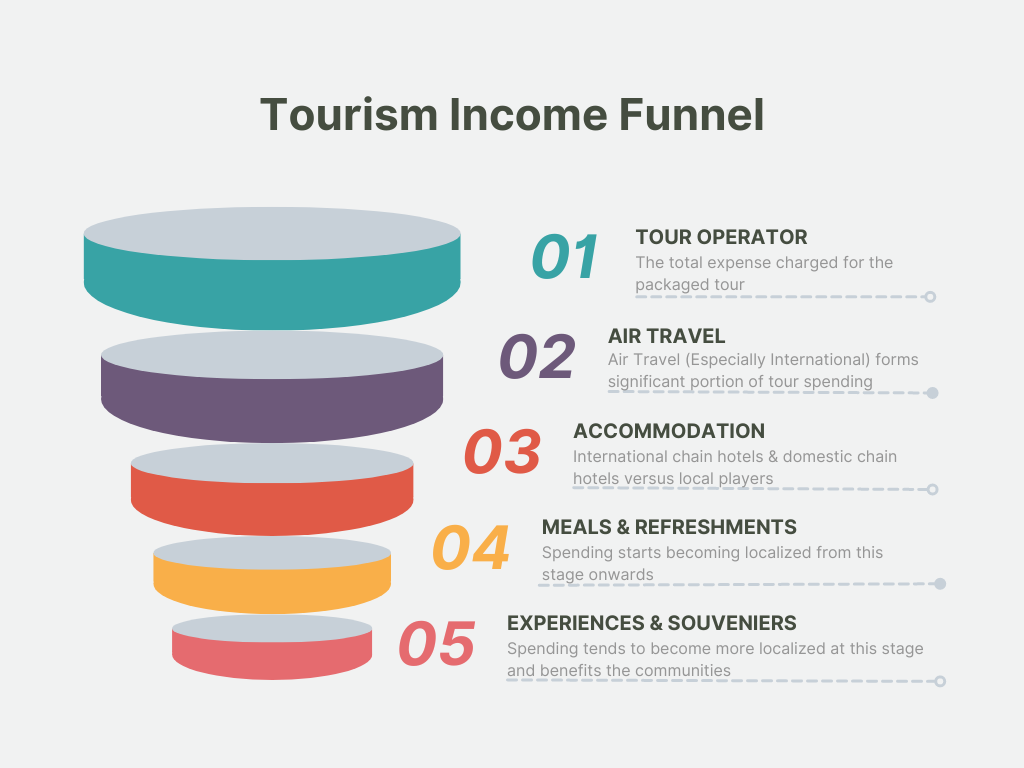Tourism leakage refers to the phenomenon where a significant portion of the revenue generated by the tourism industry in a particular destination leaves the local economy and flows out to external entities. This leakage occurs when a large portion of the money spent by tourists on various goods and services, such as accommodations, transportation, and tour operators, is repatriated to foreign businesses or individuals instead of staying within the local community.
There are several ways in which tourism leakage can occur. One common scenario is when international companies dominate the tourism industry in a destination, such as multinational hotel chains, cruise lines, or travel agencies. These companies often repatriate a significant portion of their profits to their home countries, reducing the economic benefits that could have been enjoyed by the local community.

Let us study the Tourism Income Funnel a little closely starting from the point when the tourist starts planning to the point where the tour concludes. The Tour Operator packages the tour in a manner that contains Air Tickets, Accommodations, Ground Transportation, Meals & Experiences bundled into a single product. This helps the Tour Operator maximize their wallet-share and it helps the Tourist increase predictability of tour experience.
The leakage is profound when the tour originates from a developed nation and the destination is a developing nation. According to pre-COVID statistics from World Tourism Organization, tourism leakage was as high as 80% in the Carribean Island nations and Thailand had it at 70% while India was having leakages at 40%.
The developed nations having large international air carriers operating up to the last mile or nearest airport to the destination. And where they do not operate, they serve through codeshare agreements and the customers still book their flight tickets on the developed country’s airlines. This compounded with large chain hotels operating internationally make a big share of the tourist spending.
Another form of tourism leakage happens when a destination heavily relies on imported goods and services to meet the demands of tourists. Local businesses may not be able to compete with the lower prices or higher quality offered by international suppliers, leading to a situation where a considerable amount of money spent by tourists goes towards importing goods and services from outside. An example of this problem is visible even in developed nations. The souvenirs on sale at various tourist places all over the world, including developed nations like USA & UK rely heavily on cheap Chinese imports. While the impact of such leakage is marginal for developed nations who already pocket significant share of the tourism spend, the impact of such leakage in developing nations is serious.
The impacts of tourism leakage on communities can be profound. Here are a few key consequences:
- Economic Disparity: Leakage can exacerbate economic inequalities, as the benefits of tourism are concentrated in the hands of a few large businesses or foreign entities. Local small and medium-sized enterprises often struggle to compete, resulting in limited opportunities for local entrepreneurs and workers.
- Limited Local Employment: Leakage can hinder the creation of jobs for the local population. When international companies dominate the tourism sector, they may bring in their own staff, leaving limited employment opportunities for local residents.
- Reduced Local Investment: Leakage can discourage local businesses and investors from reinvesting in the community. If a significant portion of tourism revenue leaves the destination, there is less capital available for infrastructure development, environmental conservation, and other community projects.
- Cultural Erosion: When tourism is primarily focused on satisfying the preferences of international visitors, it can lead to a loss of local cultural identity. Authentic experiences and products may be overshadowed by standardized offerings catering to mass tourism.
To mitigate tourism leakage, destinations can implement strategies such as promoting community-based tourism, supporting local businesses, encouraging responsible tourism practices, and fostering partnerships between the public and private sectors. These efforts can help ensure a more equitable distribution of tourism benefits and create a sustainable tourism industry that positively impacts.
At DestinationMantra.com, we are working towards increasing the visibility of domestic tourist destinations through conscious branding and digital marketing. Get in touch with us to understand how we can help your business.
A few things we’re great at
Lorem ipsum dolor sit amet, at mei dolore tritani repudiandae. In his nemore temporibus consequuntur, vim ad prima vivendum consetetur.

Lorem ipsum
Lorem ipsum dolor sit amet, at mei dolore tritani repudiandae. In his nemore temporibus consequuntur, vim ad prima vivendum.

Lorem ipsum
Lorem ipsum dolor sit amet, at mei dolore tritani repudiandae. In his nemore temporibus consequuntur, vim ad prima vivendum.

Lorem ipsum
Lorem ipsum dolor sit amet, at mei dolore tritani repudiandae. In his nemore temporibus consequuntur, vim ad prima vivendum.
A few things we’re great at
Lorem ipsum dolor sit amet, at mei dolore tritani repudiandae. In his nemore temporibus consequuntur, vim ad prima vivendum consetetur.

Lorem ipsum
Lorem ipsum dolor sit amet, at mei dolore tritani repudiandae. In his nemore temporibus consequuntur, vim ad prima vivendum.

Lorem ipsum
Lorem ipsum dolor sit amet, at mei dolore tritani repudiandae. In his nemore temporibus consequuntur, vim ad prima vivendum.

Lorem ipsum
Lorem ipsum dolor sit amet, at mei dolore tritani repudiandae. In his nemore temporibus consequuntur, vim ad prima vivendum.

No responses yet